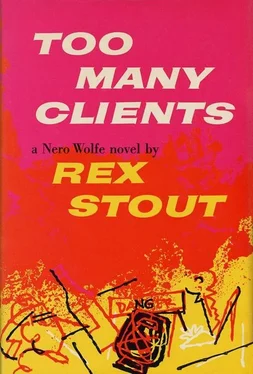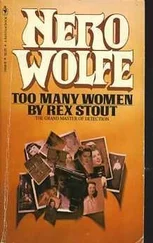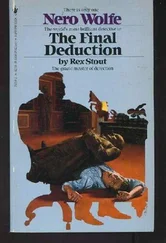With means, opportunity, and motive hopeless, all you can do is go fishing. Catch somebody in a lie. Find two pieces that are supposed to fit but don’t. Find someone who saw or heard something — for example, someone in that house or that block who had noticed people entering or leaving the basement entrance of Number 156 who didn’t appear to belong to the neighborhood. That program might get results if you had four or five good operatives and didn’t care how long it took. But since Homicide might uncover a lead to that house any minute, and if they did they would find Fred Durkin there, and the fur would fly, and we would no longer have a client because what he wanted to buy couldn’t be had, it wouldn’t do. We needed either a genius or a lucky break.
Of course we had a genius, Nero Wolfe, but apparently he hadn’t turned his switch on. When he came down from the plant rooms at eleven o’clock he put the day’s orchid selection, Calanthe veitchi sandhurstiana, in the vase on his desk, circled to his chair and sat, glanced at his desk calendar, and looked through the morning crop of mail, which was mostly circulars and requests for contributions. He looked at me.
“What’s this note on my calendar? Fourteen million, six hundred eighty-two thousand, two hundred thirty-five dollars and fifty-seven cents.”
“Yes, sir. I got it from the bank. That’s the cash reserve of Continental Plastic Products as shown on their statement dated January thirty-first. I thought you might like to know, and I had nothing else to do. I like to be busy at something.”
“Pfui.”
“Yes, sir. I agree.”
“Have you considered the situation?”
“I have. It’s a hell of a note. Yesterday, temporarily, we had too many clients. Two. Today we have one, and it’s still too many because we can’t possibly fill his order. If you’re going to ask me for suggestions, don’t bother. The only contribution I can make is worthless.”
“What is it?”
“Julia McGee is a liar. You’ve heard that room described, but you haven’t seen it. The man that fixed that room up, namely Yeager, did not have his secretary come there to take dictation. Any odds you want. Not even if she was a lump — he might have wanted to try an experiment — and she isn’t. She has some very good points and possibilities, speaking as a satyr. So she lies, but that gets us nowhere. However she spent her evenings with him there, she could have done what she did do, squeal on him, either because the pictures bored her or because she wanted to get solid with the president. As far as the murder is concerned, it’s a point in her favor. Having squealed on him, why should she shoot him? Do you want to ask her?”
“No.” He took in air, all his barrel would hold, and let it out again. “I was a witling to take the job. All we can do is flounder around in the slush. As evidence of our extremity, it may be that we should find the man who got us into this pickle, despite our conclusion that he didn’t know Yeager was dead. How long would it take you?”
“Something between a day and a year.”
He made a face. “Or we could try a coup. We confront Mr. and Mrs. Perez with our conviction that they killed Yeager because he had defiled their daughter. We tell them that if the police learn of the room and Yeager’s use of it they are probably doomed, as they are. Certainly they can’t hope to stay there indefinitely. We offer them a large sum, twenty thousand, fifty thousand — no matter, it will come from that cash reserve — to go to some far corner of the earth, provided they will sign a confession that they killed Yeager because their daughter told them that he had made improper advances to her. They need not admit that the advances were successful; it can even be implied that they were never made, that their daughter had invented them. The confession will be left with us, and we’ll get it to the police anonymously after they are safely out of reach. It will not mention that room. Of course the police will find it, but there will be nothing in it to connect it with Yeager. They will assume that it was his, but they can’t establish it, and they do not publish assumptions that besmirch a prominent citizen.”
“Wonderful,” I said with enthusiasm. “It only has two minor flaws. First, since Yeager owned the house, it will be an item in his estate. Second, they didn’t kill him. But what the hell, hanging a murder on—”
“That’s your opinion.”
“With damn good legs under it. I’ll concede that you’re being gallant, making Maria an inventor instead of a floozy, but it would be even better—”
I was interrupted by the doorbell. Going to the hall, I saw on the stoop what I have in mind, more or less, when I apply the word “lump” to a female. Not a hag, not a fright, just a woman, this one middle-aged or more, who would have to be completely retooled and reassembled before she could be used for show purposes. With her you would have some spare parts left when you finished, for instance the extra chin. Her well-made dark suit and her platinum mink stole were no real help. I went and opened the door and told her good morning.
“Nero Wolfe?” she asked.
I nodded. “His house.”
“I want to see him. I’m Ellen Yeager. Mrs. Thomas G. Yeager.”
When a caller comes without an appointment, I am supposed to leave him on the stoop until I consult Wolfe, and I do, but this was a crisis. Not only were we up a stump; there was even a chance that Wolfe would be pigheaded enough to try that cockeyed stunt with the Perez family if he wasn’t sidetracked. So I invited her to enter, led her to the office and on in, and said, “Mr. Wolfe, Mrs. Yeager. Mrs. Thomas G. Yeager.”
He glared at me. “I wasn’t informed that I had an appointment.”
“No, sir. You didn’t.”
“I didn’t stop to phone,” Ellen Yeager said. “It’s urgent.” She went to the red leather chair and took it as if she owned it, put her bag on the stand, and aimed sharp little eyes at Wolfe. “I want to hire you to do something.” She reached for the bag, opened it, and took out a checkfold. “How much do you want as a retainer?”
Client number four, not counting the phony Yeager. When I go scouting for clients I get results. She was going on. “My husband was murdered, you know about that. I want you to find out who killed him and exactly what happened, and then I will decide what to do about it. He was a sick man, he was oversexed, I know all about that. I’ve kept still about it for years, but I’m not going to let it keep me from—”
Wolfe cut in. “Shut up,” he commanded.
She stopped, astonished.
“I’m blunt,” he said, “because I must be. I can’t let you rattle off confidential information under the illusion that you are hiring me. You aren’t and you can’t. I’m already engaged to investigate the murder of your husband.”
“You are not,” she declared.
“Indeed?”
“No. You’re engaged to keep it from being investigated, to keep it from coming out, to protect that corporation, Continental Plastic Products. One of the directors has told me all about it. There was a meeting of the board this morning, and Benedict Aiken told them what he had done and they approved it. They don’t care if the murderer of my husband is caught or not. They don’t want him caught. All they care about is the corporation. I’ll own a block of stock now, but that doesn’t matter. They can’t keep me from telling the District Attorney about that room if I decide to.”
“What room?”
“You know perfectly well what room. In that house on Eighty-second Street where Julia McGee went last night and you got her and brought her here. Benedict Aiken told the board about it, and one of them told me.” Her head jerked to me. “Are you Archie Goodwin? I want to see that room. When will you take me there?” She jerked back to Wolfe. That’s a bad habit, asking a question and not waiting for an answer, but it’s not always bad for the askee. She opened the checkfold. “How much do you want as a retainer?”
Читать дальше












